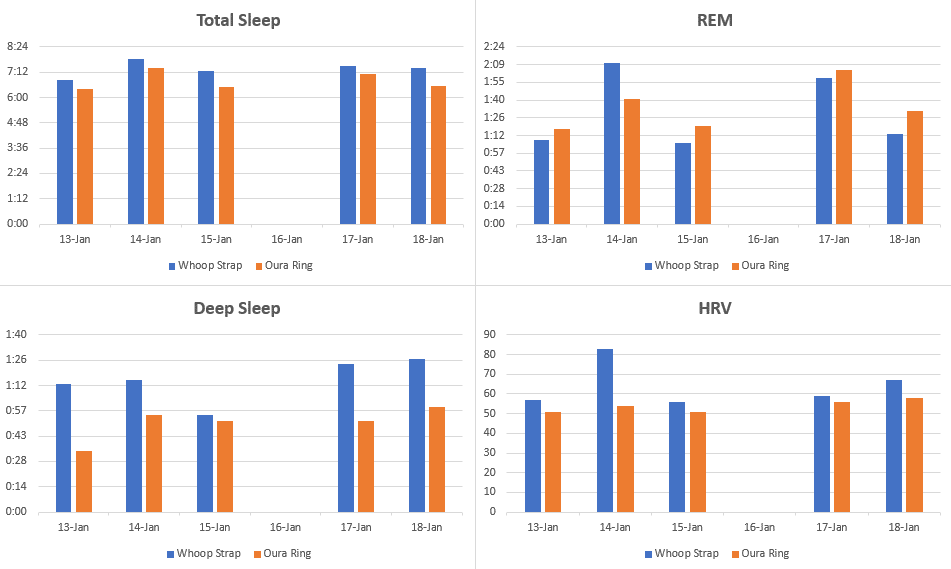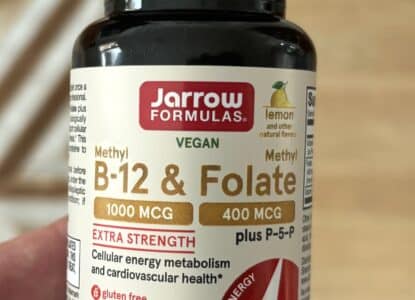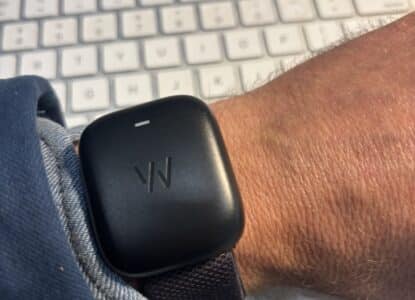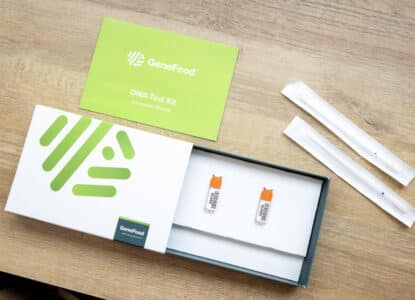Oura Ring vs. Whoop Strap: Which Sleep Tracker is Best?

Contents
- How much science is behind consumer sleep tracking devices?
- Who has the better hardware?
- Who has the better software?
- Who has the better interface?
- Which is easier to charge, the Oura Ring or Whoop Strap?
- Who has the better business model and pricing for consumers?
- Which product is better for athletes?
- Is Oura Ring or Whoop Strap more accurate?
- What happens when you wear Oura Ring and Whoop Strap on the same night?
- My overall winner
Both Whoop and Oura did impressive work during the COVID-19 pandemic helping people identify subtle symptoms of the illness (even before a test could) by monitoring respiratory rate and heart rate variability.
Many were tempted to have these data points during the pandemic to know if they were getting ill so as not to pass the virus on to loved ones and neighbors. That is quite a use case.
But now that those times are behind us, just how accurate are sleep tracking devices for everyday use?
How much science is behind consumer sleep tracking devices?
Despite their popularity, we have a dearth of studies looking at the accuracy of consumer sleep tracking devices. In fact, one of the primary studies cited by Oura to prove accuracy tracked sleep for only one night in teenagers and the accuracy vs. polysomnogragphy was decent overall, but not without some major blips.
The accuracy of these devices is still relatively unreliable vs. gold standard sleep trackers. Having said that, and as was proven out in the COVID studies, sleep trackers like Oura and Whoop are valuable as a method for tracking individual baselines over time, even if they do not give us absolutes in terms of sleep length and quality.
It should also be noted that many of the most vocal advocates for both Whoop and Oura are either investors or are paid by the companies as influencers. We do not have an affiliate relationship with either brand.
Who has the better hardware?
Having worn both Whoop and Oura for months, I will say both companies have done an excellent job developing hardware. In a previous life, I attempted a hardware startup that failed so I know first hand just how hard it is to build connected devices.
As the smaller solution that fits snugly on a finger, my overall nod for hardware goes to Oura. The Whoop, as a bracelet, is encumbered by a band that loosens and gets dirty after workouts. Because the Whoop band loosens with time, it also causes light pollution as the wrist sensor emits green light when it’s active. This causes the Whoop to emit light pollution which can actually hinder sleep. To give you an idea of how bright Whoop can be, I would use it from time to time for a night light if I woke in the middle of the night to use the bathroom. By contrast, Oura Ring emits no light and the fit of the ring stays the same no matter how long it’s used.
The Oura Ring is more compact, and I believe slightly more durable. Again, both companies have done an excellent job with hardware, but the Oura Ring has the advantage in my book.
Who has the better software?
This one isn’t close for me, it’s Oura hands down.
The main issue for me here is speed. I don’t wear either tracker every night and as a result software needs to catch up when I power on the devices after a long hiatus. Whoop takes forever to load, often staying stuck days behind. By contrast, Oura immediately loads to my present date and time. Even on mornings where I’ve worn my Whoop Strap for days in a row it can still take several hours to load the previous night’s sleep data.
Whoop has a long way to go to catch up to the impressive effieciency of Oura.
Who has the better interface?
I give the nod to Whoop here.
I prefer the recovery metric of Whoop to the Readiness score of Oura. The way the Recovery score on the Whoop screen is displayed feels softer to me than does the immediate punch of the Readiness score.
Both have the unfortunate ability to create a “Nocebo” effect whereby a poor night of sleep spirals to set the tone for the entire day.
Consider this: if you’ve not slept well, but need to put in an active day working, does it benefit you to have an app that confirms just how badly you slept? I don’t think so.
Which is easier to charge, the Oura Ring or Whoop Strap?
In addition to being very slow to load new data in the morning after a night’s sleep, the Whoop Strap is also more difficult to charge than the Oura Ring.
While Oura Ring fits elegantly on a mini docking station, Whoop requires a bulky (and easy to lose) battery pack that attaches on to the back of the strap when you want to charge. New Whoop batteries are $30 per battery.
Who has the better business model and pricing for consumers?
Oura is the clear winner here, especially if you plan to wear the sleep tracker for over a year. Unless you go with an extra fancy finish, most Oura Rings range in price between $299 – $499, but it’s a one time purchase.
By contrast, Whoop offers “membership” for a monthly subscription of $30 per month. While it is possible to join teams and have some degree of interactivity with Whoop, the membership model is a real stretch and very likely reflects the preferences of the venture money behind the product rather than what is best for consumers.
Which product is better for athletes?
This is a mixed bag. On the one hand, the Whoop strap itself gets wet and dirty, both in the shower and while sweating. After enough uses, you will need to buy additional straps, whereas the Oura Ring is very easy to rinse off and clean.
Having said that, the Whoop Strap, with it’s focus on recovery and “daily strain” (a measure of athletic exertion) seems like a better fit for athletes who want to get a good handle on how hard they are pushing themselves athletically. Having worn the Oura Ring while living in NYC and comparing the step counter to the totals on my iPhone (which were nicely corroborated by how far I knew I had moved throughout familiar neighborhoods) I have serious doubts about the Oura Ring’s ability to accurately track movement accurately.
Is Oura Ring or Whoop Strap more accurate?
It’s impossible to know for sure as the results will vary by individual and by sleep style, but my personal belief is that the Whoop Strap is more accurate for me. Why do I say that? In part because of the accuracy study Oura Ring published.
Researchers in San Francisco took 41 subjects aged 14-22 and tracked their sleep for a single night against the gold standard brain wave trackers which use polysomnography (PSG) technology. The OURA ring technology uses a proprietary blend of heart rate tracking combined with tech called actigraphy, a more “old school” motion sensor method for sleep tracking. The charts below map the reliability of the OURA ring vs. PSG methods of tracking sleep. Start at the first graph on the top left. There you see that the OURA ring, in most cases, tracks in line with the PSG test which is impressive. But when you see the 41 individuals represented on the charts you see that it was not uncommon at all for OURA to get even total sleep time off by 30 minutes, and in some cases, approaching an hour – both over and underestimating sleep.
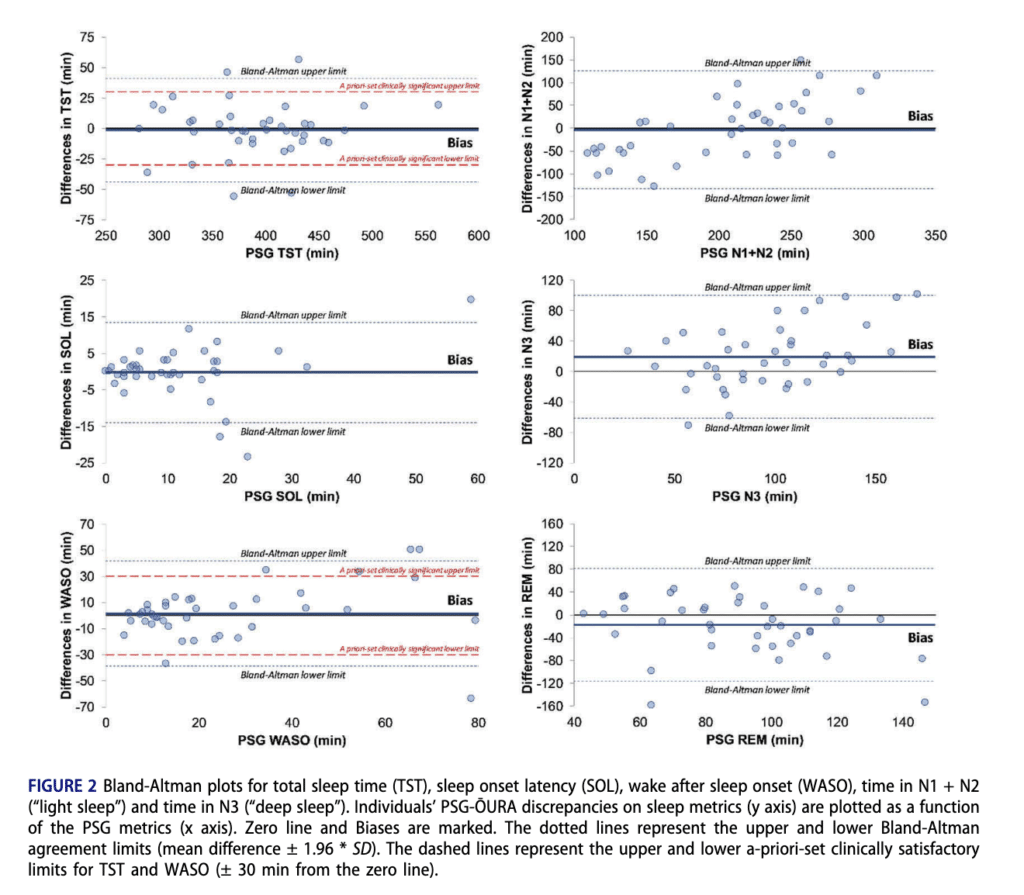
In my case, Whoop usually gives me about 15-30 minutes more sleep than Oura. My hunch is that this happens because Oura, worn on the finger, gets tricked with more frequent “micro-movements” than does Whoop which is attached to the wrist, an overall more stable part of the body. I could be wrong, but that’s my assumption.
What happens when you wear Oura Ring and Whoop Strap on the same night?
Below is a sample of data from 5 nights where I wore the Whoop and Oura Ring on the same night. I tried this experiment for more than 5 nights, but the patterns pictured below largely held firm. As you can see from the visual below, Whoop consistently tracked more total and deep sleep, whereas the devices were fairly comparable on REM sleep and heart rate variability. My HRV was trending a little on the low side because I had just come back to altitude (about 6,200 feet above sea level) after time spent at sea level with family for the holidays.
My overall winner
I’m tempted to choose the Whoop Strap here because it gave me better sleep readings, but having used both sleep trackers for months, and having worn both at the same time, the Oura Ring is the clear better product from almost every standpoint, even if there are issues with accuracy for both devices.

